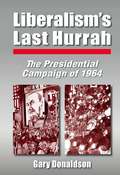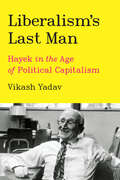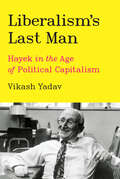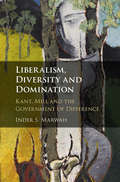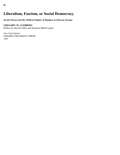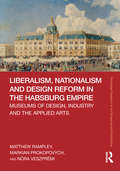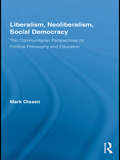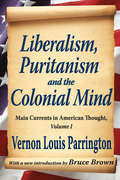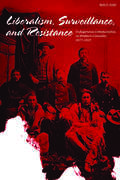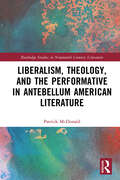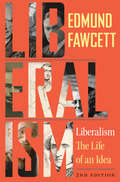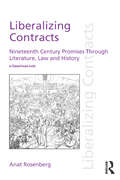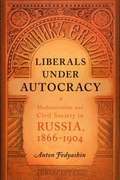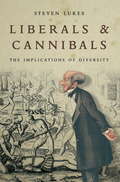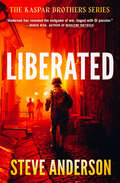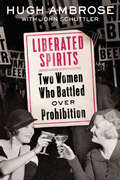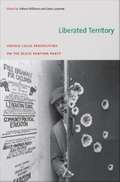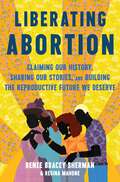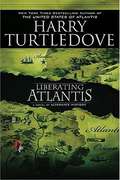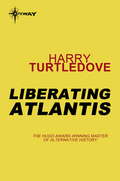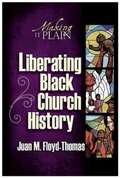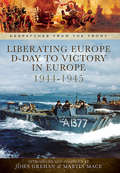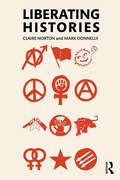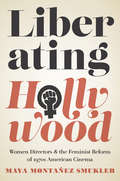- Table View
- List View
Liberalism's Last Hurrah: The Presidential Campaign of 1964
by Robert H DonaldsonMarked by sharp ideological divisions over civil rights, Vietnam, and federal power, the 1964 presidential campaign between Democrat Lyndon Johnson and Republican Barry Goldwater proved a watershed election in American history. Although Johnson defeated Goldwater in a landslide and liberalism seemed to ride triumphant, the liberal wave crashed almost immediately and conservatives came to dominate a resurgent Republican Party in the late twentieth century. Thoroughly researched and beautifully written, this is the first historical account of this crucial election, and the transition it marked for the nation. Filled with colorful details and fascinating figures - Johnson, Goldwater, Wallace, Rockefeller, Nixon, Reagan, Robert Kennedy, Martin Luther King, Jr., George Bush, and many more - it captures the full excitement, drama, and significance of "liberalism's last hurrah."
Liberalism's Last Man: Hayek in the Age of Political Capitalism
by Vikash YadavA modern reframing of Friedrich Hayek’s most famous work for the 21st century. Friedrich Hayek’s The Road to Serfdom was both an intellectual milestone and a source of political division, spurring fiery debates around capitalism and its discontents. In the ensuing discord, Hayek’s true message was lost: liberalism is a thing to be protected above all else, and its alternatives are perilous. In Liberalism’s Last Man, Vikash Yadav revives the core of Hayek’s famed work to map today’s primary political anxiety: the tenuous state of liberal meritocratic capitalism—particularly in North America, Europe, and Asia—in the face of strengthening political-capitalist powers like China, Vietnam, and Singapore. As open societies struggle to match the economic productivity of authoritarian-capitalist economies, the promises of a meritocracy fade; Yadav channels Hayek to articulate how liberalism’s moral backbone is its greatest defense against repressive social structures.
Liberalism's Last Man: Hayek in the Age of Political Capitalism
by Vikash YadavA modern reframing of Friedrich Hayek’s most famous work for the 21st century.Friedrich Hayek’s The Road to Serfdom was both an intellectual milestone and a source of political division, spurring fiery debates around capitalism and its discontents. In the ensuing discord, Hayek’s true message was lost: liberalism is a thing to be protected above all else, and its alternatives are perilous.In Liberalism’s Last Man, Vikash Yadav revives the core of Hayek’s famed work to map today’s primary political anxiety: the tenuous state of liberal meritocratic capitalism—particularly in North America, Europe, and Asia—in the face of strengthening political-capitalist powers like China, Vietnam, and Singapore. As open societies struggle to match the economic productivity of authoritarian-capitalist economies, the promises of a meritocracy fade; Yadav channels Hayek to articulate how liberalism’s moral backbone is its greatest defense against repressive social structures.
Liberalism, Diversity and Domination: Kant, Mill and the Government of Difference
by Inder S. MarwahThis study addresses the complex and often fractious relationship between liberal political theory and difference by examining how distinctive liberalisms respond to human diversity. Drawing on published and unpublished writings, private correspondence and lecture notes, the study offers comprehensive reconstructions of Immanuel Kant's and John Stuart Mill's treatment of racial, cultural, gender-based and class-based difference to understand how two leading figures reacted to pluralism, and what contemporary readers might draw from them. The book mounts a qualified defence of Millian liberalism against Kantianism's predominance in contemporary liberal political philosophy, and resists liberalism's implicit association with imperialist domination by showing different divergent responses to diversity. Here are two distinctive liberal visions of moral and political life.
Liberalism, Fascism, Or Social Democracy: Social Classes And The Political Origins Of Regimes In Interwar Europe
by Seymour Martin Lipset David Collier Gregory M. LuebbertThis work provides a sweeping historical analysis of the political development of Western Europe in the late nineteenth and early twentieth century. Arguing that the evolution of most Western European nations into liberal democracies, social democracies, or fascist regimes was attributable to a discrete set of social class alliances, the author explores the origins and outcomes of the political development in the individual nations. In Britain, France, and Switzerland, countries with a unified middle class, liberal forces established political hegemony before World War I. By coopting considerable sections of the working class with reforms that weakened union movements, liberals essentially excluded the fragmented working class from the political process, remaining in power throughout the inter-war period. In countries with a strong, cohesive working class and a fractured middle class, Luebbert points out, a liberal solution was impossible. In Norway, Sweden, Denmark, and Czechoslovakia, political coalitions of social democrats and the "family peasantry" emerged as a result of the First World War, leading to social democratic governments. In Italy, Spain, and Germany, on the other hand, the urban middle class united with a peasantry hostile to socialism to facilitate the rise of fascism.
Liberalism, Imperialism, and the Historical Imagination
by Theodore KoditschekThis book examines the ways in which imperial agendas informed the writing of history in nineteenth-century Britain and how historical writing transformed imperial agendas. Using the published writings and personal papers of Walter Scott, J. A. Froude, James Mill, Rammohun Roy, T. B. Macaulay, E. A. Freeman, W. E. Gladstone, and J. R. Seeley among others, Theodore Koditschek sheds new light on the role of the historical imagination in the establishment and legitimation of liberal imperialism. He shows how both imperialists and the imperialized were drawn to reflect back on Empire's past as a result of the need to construct a modern, multi-national British imperial identity for a more economically expansive and enlightened present. By tracing the imperial lives and historical works of these pivotal figures, Theodore Koditschek illuminates the ways in which discourse altered practice, and vice versa, as well as how the history of Empire was continuously written and re-written.
Liberalism, Nationalism and Design Reform in the Habsburg Empire: Museums of Design, Industry and the Applied Arts (Routledge Research in Art Museums and Exhibitions)
by Matthew Rampley Markian Prokopovych Nóra VeszprémiLiberalism, Nationalism and Design Reform in the Habsburg Empire is a study of museums of design and applied arts in Austria-Hungary from 1864 to 1914. The Museum for Art and Industry (now the Museum of Applied Arts) as well as its design school occupies a prominent place in the study. The book also gives equal attention to museums of design and applied arts in cities elsewhere in the Empire, such as Budapest Prague, Cracow, Brno and Zagreb. The book is shaped by two broad concerns: the role of liberalism as a political, cultural and economic ideology motivating the museums’ foundation, and their engagement with the politics of imperial, national and regional identity of the late Habsburg Empire. This book will be of interest for scholars of art history, museum studies, design history, and European history.
Liberalism, Neoliberalism, Social Democracy: Thin Communitarian Perspectives on Political Philosophy and Education (Routledge Studies in Social and Political Thought)
by Mark OlssenThe Credit Crunch of 2008 has exposed the fallacies of neoliberalism and its thesis of the self-regulating market, which has been ascendant in both economic theory and policy over the last 30 years. In moving beyond neoliberalism, social democratic arguments are once again coming to the fore; however, in the context of the 21st century, they will need to be theorized in relation to new global concerns. This book critically revisits the core theses of liberalism and neoliberalism that have provided philosophical support to free market economics - as enunciated in the writings of liberal political philosophers such as Friedrich von Hayek, Karl Popper and Isaiah Berlin - and seeks to expose the deficiencies of their beliefs that became hegemonic from the 1970s until the first decades of the present century. In moving beyond the formulas and mantras of liberalism, the book seeks to re-theorize social democracy and articulate a new vision of the political arrangements needed for the 21st century by reconsidering issues such as liberty, autonomy, social dependence and multiculturalism.
Liberalism, Puritanism and the Colonial Mind: Main Currents In American Thought
by Richard LabunskiIn Liberalism, Puritanism and the Colonial Mind, Parrington gives a brilliant account of the beginning and development in American letters, the early ideas that have come to be reckoned as traditionally American—how they came into being, how they were opposed, and what influence they have exerted in determining the form and scope of our ideals and institutions. In doing so, the author follows the path of political, economic, and social development. This first of a three-volume work carries the account from early beginnings in Puritan New England to the triumph of Jefferson and back-country agrarianism.This first part of Main Currents in American Thought deals with intellectual backgrounds, especially with those diverse systems of European thought that have domesticated themselves in America. Parrington examines the legacies of seventeenth- and eighteenth-century Europe to the colonial settlements and, in particular, the transplanting to America of old-world liberalisms.The liberalisms discussed in this book derive from two primary sources, English Independency and French Romantic theory, supplemented by English Whiggery. From the first came the revolutionary doctrine of natural rights, clarified by thinkers ranging from Roger Williams to John Locke. A doctrine that destroyed the philosophical sanction of divine right and substituted it for the traditional absolutism was formed. This struggle largely determined the course of development in early New England. A new introduction by Bruce Brown highlights the life of Vernon Louis Parrington and explains the importance of this Pulitzer-Prize winning study.
Liberalism, Surveillances and Resistance
by Keith D. SmithIndigenous communities in Western Canada, 1877-1927
Liberalism, Theology, and the Performative in Antebellum American Literature (Routledge Studies in Nineteenth Century Literature)
by Patrick McDonaldThe 1850s United States witnessed a far-reaching political, social, and economic crisis. Symptomatic of this, a wide range of narrative fiction from sentimental novels to sensational drama identifies a foundational link between liberal institutions and performative utterances. Auctions, trials, marriages, and contracts, this fiction contends, all depend on the self-constituting authority of words and performances which anybody and everybody can appropriate and are always subject to misfiring. Rather than viewing this as a liberatory and egalitarian political force, however, writers from Herman Melville and James Fenimore Cooper to Captain Mayne Reid and E.D.E.N. Southworth insist that such naked authority must be supplemented. A broad swath of 1850s literature insists that this supplement ought to come from Christianity. Anticipating thinkers like Carl Schmitt and Giorgio Agamben, these works suggest that legitimate political authority depends upon its ability to represent Christian transcendence and account for revealed truth, something firmly outside of speech acts’ and performance’s purview. In so doing, this diverse body of fiction registers a desire to reconstitute political authority on transcendent and representable ground, augmenting institutional reliance on mere words and assuaging the contemporary crises of confidence and authority.
Liberalism: The Life of an Idea Second Edition, Second Edition
by Edmund FawcettDespite playing a decisive role in shaping the past two hundred years of American and European politics, liberalism is no longer the dominant force it once was. In this expanded and updated edition of what has become a classic history of liberalism, Edmund Fawcett traces its ideals, successes, and failures through the lives and ideas of exemplary thinkers and politicians from the early nineteenth century to today. Significant revisions--including a new conclusion--reflect recent changes affecting the world political order that many see as presenting new and very potent threats to the survival of liberal democracy as we know it. A richly detailed account of a vulnerable but critically important political creed, this book reminds us that to defend liberalism it is vital to understand its character and history.
Liberalizing Contracts: Nineteenth Century Promises Through Literature, Law and History
by Anat RosenbergIn Liberalizing Contracts Anat Rosenberg examines nineteenth-century liberal thought in England, as developed through, and as it developed, the concept of contract, understood as the formal legal category of binding agreement, and the relations and human practices at which it gestured, most basically that of promise, most broadly the capitalist market order. She does so by placing canonical realist novels in conversation with legal-historical knowledge about Victorian contracts. Rosenberg argues that current understandings of the liberal effort in contracts need reconstructing from both ends of Henry Maine's famed aphorism, which described a historical progress "from status to contract." On the side of contract, historical accounts of its liberal content have been oscillating between atomism and social-collective approaches, missing out on forms of relationality in Victorian liberal conceptualizations of contracts which the book establishes in their complexity, richness, and wavering appeal. On the side of status, the expectation of a move "from status" has led to a split along the liberal/radical fault line among those assessing liberalism's historical commitment to promote mobility and equality. The split misses out on the possibility that liberalism functioned as a historical reinterpretation of statuses – particularly gender and class – rather than either an effort of their elimination or preservation. As Rosenberg shows, that reinterpretation effectively secured, yet also altered, gender and class hierarchies. There is no teleology to such an account.
Liberals Under Autocracy
by Anton A. FedyashinWith its rocky transition to democracy, post-Soviet Russia has made observers wonder whether a moderating liberalism could ever succeed in such a land of extremes. But inLiberals under Autocracy, Anton A. Fedyashin looks back at the vibrant Russian liberalism that flourished in the country’s late imperial era, chronicling its contributions to the evolution of Russia’s rich literary culture, socioeconomic thinking, and civil society. For five decades prior to the revolutions of 1917,The Herald of Europe(Vestnik Evropy) was the flagship journal of Russian liberalism, garnering a large readership. The journal articulated a distinctively Russian liberal agenda, one that encouraged social and economic modernization and civic participation through local self-government units (zemstvos) that defended individual rights and interests-especially those of the peasantry-in the face of increasing industrialization. Through the efforts of four men who turnedThe Heraldinto a cultural nexus in the imperial capital of St. Petersburg, the publication catalyzed the growing influence of journal culture and its formative effects on Russian politics and society. Challenging deep-seated assumptions about Russia’s intellectual history, Fedyashin’s work casts the country’s nascent liberalism as a distinctly Russian blend of self-governance, populism, and other national, cultural traditions. As such, the book stands as a contribution to the growing literature on imperial Russia's nonrevolutionary, intellectual movements that emphasized the role of local politics in both successful modernization and the evolution of civil society in an extraparliamentary environment.
Liberals and Cannibals: The Implications of Diversity
by Steven LukesWith debates on the meaning of 'liberal society' more heated than ever, this is a timely re-issue of a classic textCan the tension between relativism and the moral universalism current in contemporary politics be resolved within the framework of liberalism? How is liberal society to interpret the diversity of morals? Is pluralism the appropriate response? How does pluralism differ from the widely condemned ethnocentric relativism -'liberalism for the Liberals, cannibalism for the cannibals'?Confronting liberal thought with its own limitations, Steven Lukes' work is more relevant than ever. While recognizing the dangers of moral imperialism, Lukes argues that a relativist position based on identifying clearly distinct cultural and moral communities is incoherent. Drawing on work in anthropology and philosophy, he examines the nature of social justice, the politics of identity and human rights theory.From the Trade Paperback edition.
Liberated (The Kaspar Brothers)
by Steve AndersonAn American captain in post-WWII Germany must stop a criminal conspiracy by his fellow officers in this historical thriller by the author of The Losing Role. Germany, May, 1945. With the war just over, Capt. Harry Kaspar is about to take a new posting in the US occupation—running a Bavarian town named Heimgau. When Harry loses the command to a rival, he&’ll do almost anything to win the job back. Then Harry discovers a horrific scene: three German men tortured and murdered. Solving the crime could teach the locals about American justice—and help him reclaim his posting. But as Harry&’s quest for the killer leads him back to American officers, he uncovers a criminal network plundering the war-torn land for all its worth. Now, for justice to mean anything at all, Harry must fight back.
Liberated Spirits: Two Women Who Battled Over Prohibition
by Hugh Ambrose John SchuttlerA provocative new take on the women behind a perennially fascinating subject--Prohibition--by bestselling author and historian Hugh Ambrose.The passage of the 18th Amendment (banning the sale of alcohol) and the 19th (women's suffrage) in the same year is no coincidence. These two Constitutional Amendments enabled women to redefine themselves and their place in society in a way historians have neglected to explore. Liberated Spirits describes how the fight both to pass and later to repeal Prohibition was driven by women, as exemplified by two remarkable women in particular. With fierce drive and acumen, Mabel Willebrandt transcended the tremendous hurdles facing women lawyers and was appointed Assistant Attorney General. Though never a Prohibition campaigner, once in office she zealously pursued enforcement despite a corrupt and ineffectual agency.Wealthy Pauline Sabin had no formal education in law or government but she too fought entrenched discrimination to rise in the ranks of the Republican Party. While Prohibition meant little to her personally--aristocrats never lost access to booze--she seized the fight to repeal it as a platform to bring newly enfranchised women into the political process and compete on an equal footing with men.Along with a colorful cast of supporting characters, from rumrunners and Prohibition agents on the take to senators and feuding society matrons, Liberated Spirits brings the Roaring Twenties to life in a brand new way.
Liberated Territory: Untold Local Perspectives On the Black Panther Party
by Jama Lazerow Yohuru WilliamsWith their collection In Search of the Black Panther Party, Yohuru Williams and Jama Lazerow provided a broad analysis of the Black Panther Party and its legacy. In Liberated Territory, they turn their attention to local manifestations of the organization, far away from the party's Oakland headquarters. This collection's contributors, all historians, examine how specific party chapters and offshoots emerged, developed, and waned, as well as how the local branches related to their communities and to the national party. The histories and character of the party branches vary as widely as their locations. The Cape Verdeans of New Bedford, Massachusetts, were initially viewed as a particular challenge for the local Panthers but later became the mainstay of the Boston-area party. In the early 1970s, the Winston-Salem, North Carolina, chapter excelled at implementing the national Black Panther Party's strategic shift from revolutionary confrontation to mainstream electoral politics. In Detroit, the Panthers were defined by a complex relationship between their above-ground activities and an underground wing dedicated to armed struggle. While the Milwaukee chapter was born out of a rising tide of black militancy, it ultimately proved more committed to promoting literacy and health care and redressing hunger than to violence. The Alabama Black Liberation Front did not have the official imprimatur of the national party, but it drew heavily on the Panthers' ideas and organizing strategies, and its activism demonstrates the broad resonance of many of the concerns articulated by the national party: the need for jobs, for decent food and housing, for black self-determination, and for sustained opposition to police brutality against black people. Liberated Territory reveals how the Black Panther Party's ideologies, goals, and strategies were taken up and adapted throughout the United States. Contributors: Devin Fergus, Jama Lazerow, Ahmad A. Rahman, Robert W. Widell Jr. , Yohuru Williams
Liberating Abortion: Claiming Our History, Sharing Our Stories, and Building the Reproductive Future We Deserve
by Renee Bracey Sherman Regina MahoneA galvanizing history of abortion recentering people of color to put forth a timely argument that we must liberate abortion for all.People of color have been having abortions since the dawn of time, yet our access is continuously under attack. In Liberating Abortion, award-winning abortion activist Renee Bracey Sherman and journalist Regina Mahone illustrate the long racist history that brought us to this moment, uncover the hidden figures who set the foundation activists and storytellers are building on today, and explain how abortion has been and remains essential to the health of our communities.Liberating Abortion will take you back to the basics of sex education, detailing the traditions of abortion over centuries , while examining how society makes us feel about our experiences. You’ll find rigorous research, never-before-heard stories, and eye-opening interviews with over 50 people of color who’ve had abortions, including activists, actresses, television writers, politicians, and the two Black members of Jane, the Chicago feminist service that provided abortions before Roe. With poignant storytelling and precise analysis, Liberating Abortion will change how you think about abortion forever.
Liberating Atlantis
by Harry TurtledoveFrederick Radcliff is a descendent of the family that founded Atlantis's first settlement. But he is also a slave. And when fate presents him with the opportunity to throw off his shackles once and for all, he becomes the leader of a revolutionary army of slaves determined to free all of his brethren across Atlantis. .
Liberating Atlantis
by Harry TurtledoveFrederick Radcliff is a descendant of the family that founded Atlantis's first settlement, and his grandfather Victor led the army against England to win the nation's independence. But he is also a black slave, unable to prove his lineage and forced to labour on a cotton plantation in the southern region of the country. Frederick feels the colour of his skin shouldn't keep him from having the same freedom his ancestors fought and died to win for themselves. And when fate presents him with the opportunity to throw off his shackles once and for all, he becomes the leader of a revolutionary army of black and red slaves determined to free all of his brethren across Atlantis.
Liberating Black Church History: Making It Plain
by Juan M. Floyd-ThomasNo serious scholar in biblical studies today can introduce students to his or her field without taking into account the contributions of African American scholarship. The long traditions of biblical interpretation in the Black Church, and the innovative research and writing performed by African American scholars in recent years are now essential components of a critical study of the Bible.Up to now, knowing how best to introduce the fruits of African American biblical scholarship to students has been difficult. Good resources exist, yet too often they are not written with the needs of introductory students in mind. This book meets that need by providing an overview of the most important developments in African American approaches to biblical scholarship. It offers insight into the particular ways that African American scholarship has shaped the world of biblical study.
Liberating Europe: D-day To Victory In Europe 1944-1945 (Despatches from the Front)
by Martin Mace John GrehanDespatches in this volume include the Despatch on air operations by the Allied Expeditionary Air Force in North West Europe between November 1943 and September 1944, the despatch on the assault phase of the Normandy landings June 1944, despatch on operations of Coastal Command, Royal Air Force in Operation Overlord the invasion of Europe 1944, the despatch on operations in North West Europe between 6 June 1944 and 5 May 1945, by Field Marshal the Viscount Montgomery of Alamein, Commander 21st Army Group, the despatch on the final stages of the naval war in North West Europe, and, as an addition, the despatch on the Dieppe Raid in 1942.This unique collection of original documents will prove to be an invaluable resource for historians, students and all those interested in what was one of the most significant periods in British military history.
Liberating Histories: Truths, Power, Ethics
by Mark Donnelly Claire NortonLiberating Histories makes an original, scholarly contribution to contemporary debates surrounding the cultural and political relevance of historical practices. Arguing against the idea that specifically historical readings of the past are necessary or are compelled by the force of past events themselves, this book instead focuses on other forms of past-talk and how they function in politically empowering ways against social injustices. Challenging the authority and constraints of academic history over the past, this book explores various forms of past-talk, including art, films, activism, memory, nostalgia and archives. Across seven clear chapters, Claire Norton and Mark Donnelly show how activists and campaigners have used forms of past-talk to unsettle ‘common sense’ thinking about political and social problems, how journalists, artists, curators, filmmakers and performers have referenced the past in their practices of advocacy, and how grassroots archivists help to circulate materials that challenge the power of authorised institutional archives to determine what gets to count as a demonstrable feature of the past and whose voices are part of the ‘historical record’. Written in a lucid, accessible manner, and combining insightful critical analysis and philosophical argument with clear consideration of how different forms of past-talk influence the narration of pasts in a variety of socio-political contexts, Liberating Histories is essential reading for students and scholars with an interest in historiography and the ethical and political dimensions of the historical discipline.
Liberating Hollywood: Women Directors and the Feminist Reform of 1970s American Cinema
by Maya SmuklerLiberating Hollywood examines the professional experiences and creative output of women filmmakers during a unique moment in history when the social justice movements that defined the 1960s and 1970s challenged the enduring culture of sexism and racism in the U.S. film industry. Throughout the 1970s feminist reform efforts resulted in a noticeable rise in the number of women directors, yet at the same time the institutionalized sexism of Hollywood continued to create obstacles to closing the gender gap. Maya Montañez Smukler reveals that during this era there were an estimated sixteen women making independent and studio films: Penny Allen, Karen Arthur, Anne Bancroft, Joan Darling, Lee Grant, Barbara Loden, Elaine May, Barbara Peeters, Joan Rivers, Stephanie Rothman, Beverly Sebastian, Joan Micklin Silver, Joan Tewkesbury, Jane Wagner, Nancy Walker, and Claudia Weill. Drawing on interviews conducted by the author, Liberating Hollywood is the first study of women directors within the intersection of second wave feminism, civil rights legislation, and Hollywood to investigate the remarkable careers of these filmmakers during one of the most mythologized periods in American film history.
